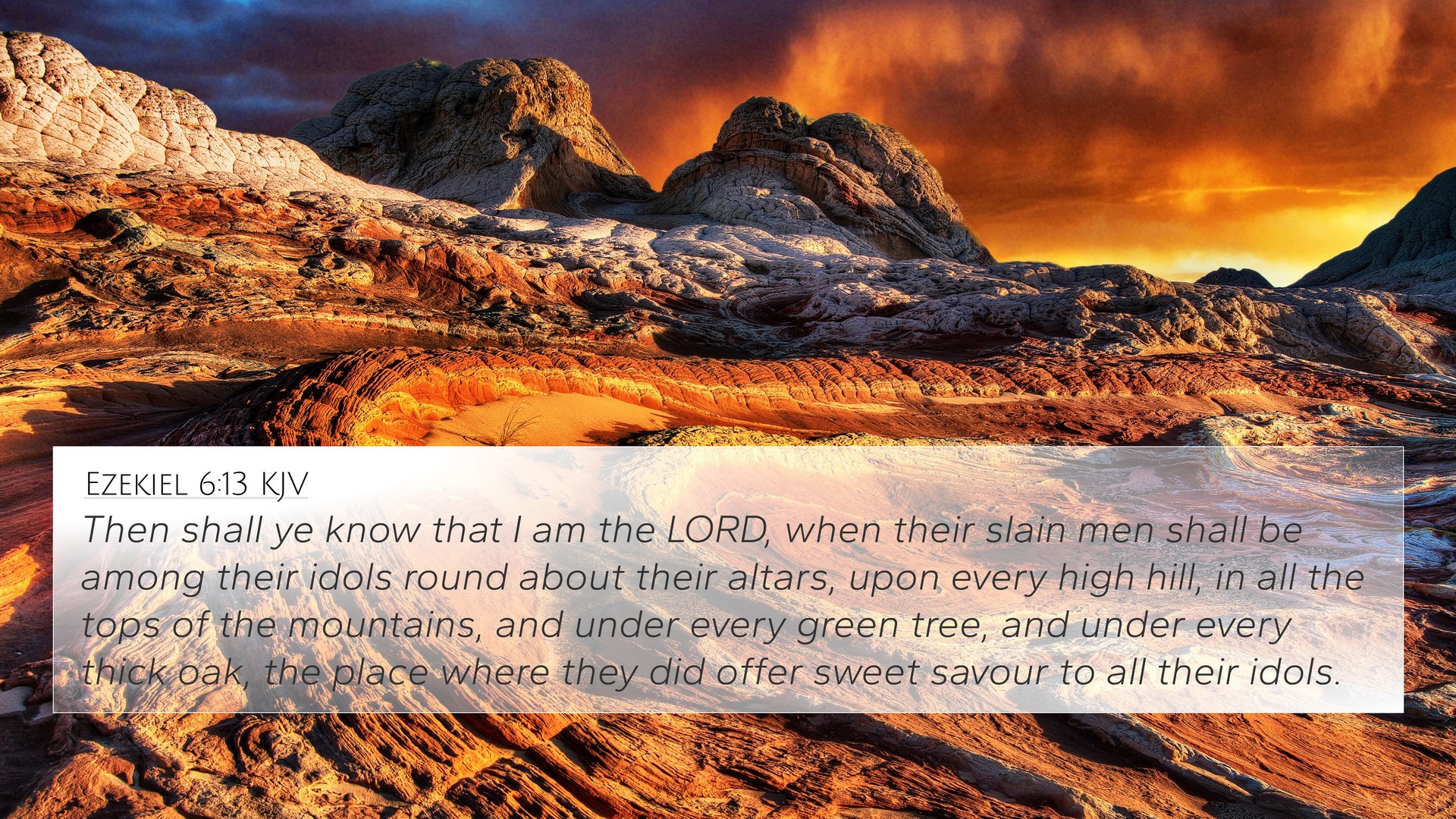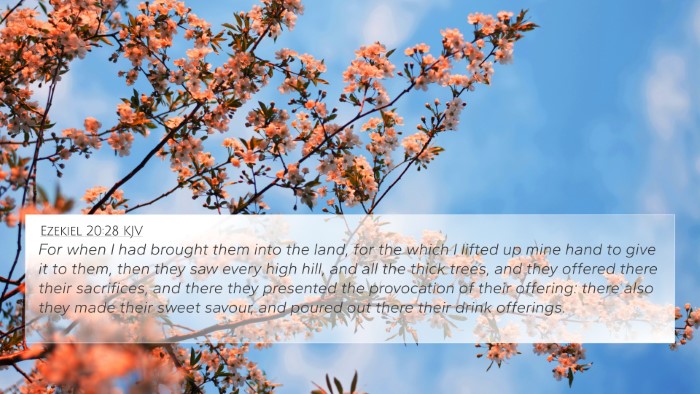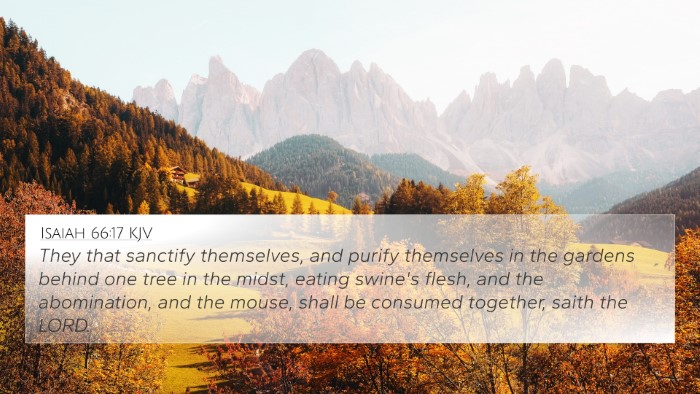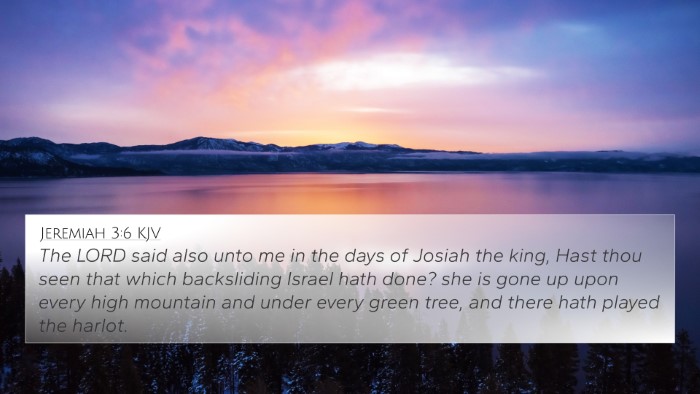Ezekiel 6:13 - Verse Meaning Summary
Ezekiel 6:13 states: "Then shall you know that I am the LORD, when their slain men shall be among their idols round about their altars, upon every high hill, in all the tops of the mountains, and under every green tree, and under every thick oak, the place where they did offer sweet savour to all their idols." This verse serves as a powerful declaration of God’s sovereignty over Israel and the judgment that would befall them due to their idolatry.
Understanding the Context
In the context of the entire chapter, God, through Ezekiel, condemns the people for their worship of idols, emphasizing that their sinful practices will lead to destruction. The imagery of slain men, idols, and places of worship signifies the consequences of turning away from the true God.
- Idolatry Condemned: The surrounding context reveals that Israel's idolatry directly violates their covenant with God, and this verse illustrates the results of forsaking Him.
- God's Judgment: The mention of "slain men" indicates the severity of God’s judgment. This theme resonates throughout the Bible, reflecting God’s insistence on righteousness.
- Recognizing God's Sovereignty: The statement "then shall you know that I am the LORD" emphasizes that God’s actions are intended to reveal His identity and authority to the Israelites.
- Symbolism of Idols: The fetishes worshipped by the Israelites signify false hopes and unattainable promises, contrasting sharply with the true deliverance found in God.
Commentary Insights
- Matthew Henry: He explains that God uses devastating circumstances to demonstrate His power and the futility of idol worship. Henry emphasizes that God must be recognized as the true source of life and salvation.
- Albert Barnes: Barnes points out that this verse illustrates God's judgment upon a people who forsake Him, filling their hearts and land with idols. He correlates defeat and dispersion as a result of their transgressions.
- Adam Clarke: Clarke interprets this sentence as a prophetic declaration indicating the forthcoming calamities that would serve as a divine sign, directing people back to true worship.
Connections Between Bible Verses
Ezekiel 6:13 has various connections with other scriptures that discuss idolatry and God’s judgments:
- Deuteronomy 32:16-17: “They provoked Him to jealousy with strange gods, with abominations provoked they Him to anger.”
- Isaiah 42:8: “I am the LORD: that is my name: and my glory will I not give to another, neither my praise to graven images.”
- Jeremiah 7:18: “The children gather wood, and the fathers kindle the fire, and the women knead their dough, to make cakes to the queen of heaven...”
- Romans 1:23: “And changed the glory of the uncorruptible God into an image made like to corruptible man...”
- Revelation 21:8: “But the fearful, and unbelieving, and the abominable, and murderers, and whoremongers, and sorcerers, and idolaters...”
- 1 John 5:21: “Little children, keep yourselves from idols. Amen.”
- Psalm 115:4-8: “Their idols are silver and gold, the work of men's hands. They have mouths, but they speak not...”
- Matthew 15:4: “For God commanded, saying, Honor thy father and mother: and, He that curseth father or mother, let him die the death.”
- Hosea 8:4: “They have set up kings, but not by me: they have made princes, and I knew it not: of their silver and their gold have they made them idols...”
- 2 Corinthians 6:16: “And what agreement hath the temple of God with idols? for ye are the temple of the living God...”
Thematic Connections and Cross-Referencing
Through this verse and its related passages, we observe major themes: the consequences of idolatry, God’s supremacy, and the call to repentance. These themes are prevalent in both Old and New Testament writings and serve as essential insights for understanding God’s nature and expectations of His people.
This verse aligns with the themes of divine judgment and the necessity for recognition of God's holiness and sovereignty. When exploring cross-references, readers can find ways these themes interconnect across different Biblical texts, forming a comprehensive basis for understanding the nature of God and the dangers of turning from Him.
Utilizing tools for Bible cross-referencing, like a Bible concordance or a cross-reference Bible study guide, can enhance scriptural study by revealing deeper contextual meanings and connections. By identifying connections between Old and New Testament writings, believers can grasp how God’s message remains consistent throughout scripture.
Conclusion
In summary, Ezekiel 6:13 serves as a poignant reminder of the consequences of idolatry and the sovereign rule of God. By engaging with this text and related scriptures, individuals can deepen their understanding of Biblical themes and explore the richness of scriptural interactions.















